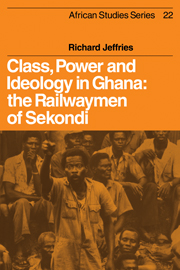Book contents
- Frontmatter
- Contents
- List of maps and tables
- Acknowledgements
- Introduction
- Part I A political history of Ghanaian railway unionism
- Part II Class, power and ideology
- Conclusion
- Appendix: Survey questionnaire administered to a sample of railway workers at Sekondi Location
- Notes
- Bibliography of sources cited
- Index
- Frontmatter
- Contents
- List of maps and tables
- Acknowledgements
- Introduction
- Part I A political history of Ghanaian railway unionism
- Part II Class, power and ideology
- Conclusion
- Appendix: Survey questionnaire administered to a sample of railway workers at Sekondi Location
- Notes
- Bibliography of sources cited
- Index
Summary
The railway workers of Sekondi have a quite exceptional history of political activity. Partly because of this legacy, they are markedly more assertive than other groups of Ghanaian workers. In spite of my presentation of one clearly deviant case, Elliot Berg's and Jeffrey Butler's early characterisation of African trade unions as generally displaying little political strength or inclination might still appear substantially accurate. Yet I would strongly suggest that, in so far as they were correct in this view, it was for very largely the wrong reasons. They accordingly misconstrued the dymanics and direction of union development. By focusing on the behaviour of the majority of workers (or unions), they also overlooked the significance of particular, more radical groups.
Berg and Butler correctly identified the skilled workers as the real force to be reckoned with in African unions. They were mistaken not only in predicting their development as an increasingly privileged group, but in suggesting that any economic gains they did make would necessarily disincline them from radical political activity. The Sekondi railwaymen have consistently assessed the legitimacy of Ghanaian regimes by wider (and more radical) criteria than immediate wage benefits. It really would seem to matter not only who the workers are (in economic terms), but how they see themselves, their social role and their rightful status within a just society.
- Type
- Chapter
- Information
- Class, Power and Ideology in GhanaThe Railwaymen of Sekondi, pp. 207 - 209Publisher: Cambridge University PressPrint publication year: 1978



